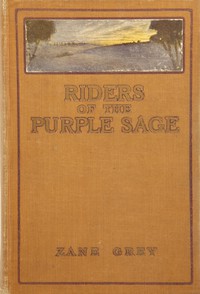The Desert of Wheat, Zane Grey [good non fiction books to read .TXT] 📗

- Author: Zane Grey
Book online «The Desert of Wheat, Zane Grey [good non fiction books to read .TXT] 📗». Author Zane Grey
Dorn somberly shook his head. "God! I did not find God out there. I cannot see God's hand in this infernal war."
"But I can. What called you so resistlessly? What made you go?"
"You know. The debt I thought I ought to pay. And duty to my country."
"Then when the debt was paid, the duty fulfilled—when you stood stricken at sight of that poor boy dying on your bayonet—what happened in your soul?"
"I don't know. But I saw the wrong of war. The wrong to him—the wrong to me! I thought of no one else. Certainly not of God!"
"If you had stayed your bayonet—if you had spared that boy, as you would have done had you seen or heard him in time—what would that have been?"
"Pity, maybe, or scorn to slay a weaker foe."
"No, no, no—I can't accept that," replied Lenore, passionately. "Can you see beyond the physical?"
"I see only that men will fight and that war will come again. Out there I learned the nature of men."
"If there's divinity in you there's divinity in every man. That will oppose war—end it eventually. Men are not taught right. Education and religion will bring peace on earth, good-will to man."
"No, they will not. They never have done so. We have educated men and religious men. Yet war comes despite them. The truth is that life is a fight. Civilization is only skin-deep. Underneath man is still a savage. He is a savage still because he wants the same he had to have when he lived in primitive state. War isn't necessary to show how every man fights for food, clothing, shelter. To-day it's called competition in business. Look at your father. He has fought and beaten men like Neuman. Look at the wheat farmers in my country. Look at the I.W.W. They all fight. Look at the children. They fight even at their games. Their play is a make-believe battle or escaping or funeral or capture. It must be then that some kind of strife was implanted in the first humans and that it is necessary to life."
"Survival of the fittest!" exclaimed Lenore, in earnest bitterness. "Kurt, we have changed. You are facing realities and I am facing the infinite. You represent the physical, and I the spiritual. We must grow into harmony with each other. We can't ever hope to learn the unattainable truth of life. There is something beyond us—something infinite which I believe is God. My soul finds it in you.… The first effects of the war upon you have been trouble, sacrifice, pain, and horror. You have come out of it impaired physically and with mind still clouded. These will pass, and therefore I beg of you don't grow fixed in absolute acceptance of the facts of evolution and materialism. They cannot be denied, I grant. I see that they are realities. But also I see beyond them. There is some great purpose running through the ages. In our day the Germans have risen, and in the eyes of most of the world their brutal force tends to halt civilization and kill idealism. But that's only apparent—only temporary. We shall come out of this dark time better, finer, wiser. The history of the world is a proof of a slow growth and perfection. It will never be attained. But is not the growth a beautiful and divine thing? Does it now oppose a hopeless prospect?… Life is inscrutable. When I think—only think without faith—all seems so futile. The poet says we are here as on a darkling plain, swept by confused alarms of struggle and flight, where ignorant armies clash by night.… Trust me, my husband! There is something in woman—the instinct of creation—the mother—that feels what cannot be expressed. It is the hope of the world."
"The mother!" burst out Dorn. "I think of that—in you.… Suppose I have a son, and war comes in his day. Suppose he is killed, as I killed that poor boy!… How, then, could I reconcile that with this, this something you feel so beautifully? This strange sense of God! This faith in a great purpose of the ages!"
Lenore trembled in the exquisite pain of the faith which she prayed was beginning to illumine Dorn's dark and tragic soul.
"If we are blessed with a son—and if he must go to war—to kill and be killed—you will reconcile that with God because our son shall have been taught what you should have been taught—what must be taught to all the sons of the future."
"What will—that be?" queried Dorn.
"The meaning of life—the truth of immortality," replied Lenore. "We live on—we improve. That is enough for faith."
"How will that prevent war?"
"It will prevent it—in the years to come. Mothers will take good care that children from babyhood shall learn the consequences of fight—of war. Boys will learn that if the meaning of war to them is the wonder of charge and thunder of cannon and medals of distinction, to their mothers the meaning is loss and agony. They will learn the terrible difference between your fury and eagerness to lunge with bayonet and your horror of achievement when the disemboweled victims lie before you. The glory of a statue to the great general means countless and nameless graves of forgotten soldiers. The joy of the conquering army contrasts terribly with the pain and poverty and unquenchable hate of the conquered."
"I see what you mean," rejoined Dorn. "Such teaching of children would change the men of the future. It would mean peace for the generations to come. But as for my boy—it would make him a poor soldier. He would not be a fighter. He would fall easy victim to the son of the father who had not taught this beautiful meaning of life and terror of war. I'd want my son to be a man."
"That teaching—would make him—all the more a man," said Lenore, beginning to feel faint.
"But not in the sense of muscle, strength, courage, endurance. I'd rather there never was peace than have my son inferior to another man's."
"My hope for the future is that all men will come to teach their sons the wrong of violence."
"Lenore, never will that day





Comments (0)